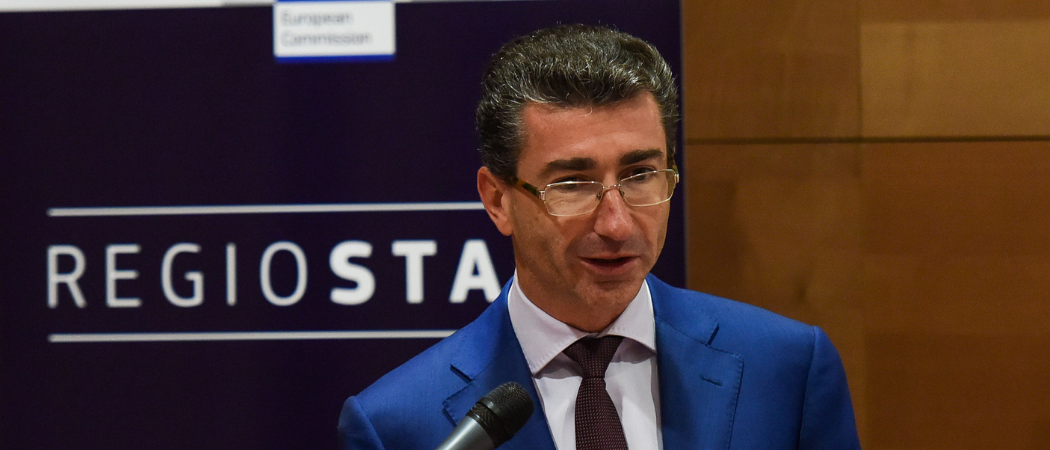Luxembourger Marc Lemaître will lead the Commission’s research directorate as EU’s €95.5 billion research framework approaches key milestones

Marc Lemaître will take over as director-general for research and innovation later this month. Photo: Jennifer Jacquemart / European Union
In an effort to get its big-spending programmes working better together, the European Commission named Marc Lemaître, currently head of its regional development funding, to run its big research and innovation programme.
Lemaître, a Luxembourger, will become director-general for research and innovation starting 16 February. In that post, he will be the top civil servant reporting to research commissioner Mariya Gabriel, and will be responsible for the €95.5 billion Horizon Europe programme.
The appointment was immediately interpreted in Brussels as a nod to long-standing complaints that the two directorates-general – his old one at DG REGIO and his new one at DG Research – don’t play well together. That’s partly baked into the political system: member states make the key decisions on regional funding, whereas the Commission has more control of research funding. But prior efforts have repeatedly failed to get the two programmes to coordinate their spending for more impact.
Christian Ehler, one of European Parliament’s leading voices on R&I, welcomed Lemaître’s appointment, noting his extensive experience in top Commission jobs could help R&I take centre stage in the EU policy machinery.
“Particularly his experience with regional policy is welcome, because we still have a long way to go when it comes to synergies between Horizon Europe and the regional funds,” said Ehler, who highlighted hopes the new chief will see the Parliament as an ally.
Joep Roet, policy adviser at the Netherlands house for Education and Research, called the choice exciting but logical. “Accomplishing synergies between the regional funds and Horizon has been notoriously difficult. After 6 years at [DG] REGIO, he can now try from the other side,” said Roet. “Curious how his regional experience will play out in the research fields, which does not work with regional envelopes.”
Since 2017, Lemaître has led the Commission’s regional and urban policy directorate (DG REGIO), aiding EU efforts to reduce disparities across Europe. This included overseeing the development of the crisis response initiative, React-EU, and helping commissioner Elisa Ferreira launch a high-level group on reforming cohesion funding.
The long-time civil servant also has experience working with EU budgets, having served as head of cabinet for former budget commissioner Janusz Lewandowski and two commissioners in charge of regional policy, Pawel Samecki and Danuta Hübner.
Robert-Jan Smits, former director general of research and innovation and president of the executive board of the Eindhoven University of Technology, noted Lemaître’s know-how of the EU budget will come in handy in future funding talks. “Marc knows the EU budget inside and out,” Smits told Science|Business.
Before Lemaître’s appointment, Brussels’ rumours mill had been speculating the new director general appointment could be a nod to advocates of a more equitable geographical distribution of EU research funds. Under Horizon 2020 less than 6% of the budget went to member states that joined the bloc after 2004, with the bulk of the grant money going to Germany, France, UK and other rich countries.
Lemaître replaces Jean-Eric Paquet, who left to serve as EU ambassador to Japan in September, after four years at the helm of the research directorate. Signe Ratso, previously second in command at the directorate-general, has been temporarily filling the shoes since.
The Brussels research bubble strongly welcomed the Commission finally choosing a replacement for Paquet, as the EU’s €95.5 billion Horizon Europe research programme approaches key milestones.
Kurt Deketelaere, president of the League of European Research Universities (LERU), said he was glad the decision was made, as “important times are coming up”, looking to Horizon Europe’s upcoming mid-term evaluation, questions over EU’s industrial policy, negotiations over the next EU budget framework and talks on a potential EU budget review.
Deketelaere noted Lemaître is familiar with two key issues on the table right now: the EU budget game and concerns over geographical imbalances in EU research frameworks, which the Widening programme is trying to address.
Muriel Attané, secretary general of the European Association of Research and Technology Organisation (EARTO), also highlighted preparations for the next EU research programme, due to start in 2028. “We are very glad to have now a new head of the DG, just in time for FP10 preparation. We are looking forward to working with him, as we did in his position at DG REGIO,” said Attané.
The appointment has been a long time coming. Ehler noted he welcomed the news, “if only because it is unimaginable that a key DG was without leadership so long in a turbulent time.”
And it wasn’t a surprise to all. “Marc’s appointment does not come as a surprise since his name was already mentioned for several months. It’s just a bit strange that it took the Commission that long to actually appointment him at RTD,” noted Smits.





 A unique international forum for public research organisations and companies to connect their external engagement with strategic interests around their R&D system.
A unique international forum for public research organisations and companies to connect their external engagement with strategic interests around their R&D system.